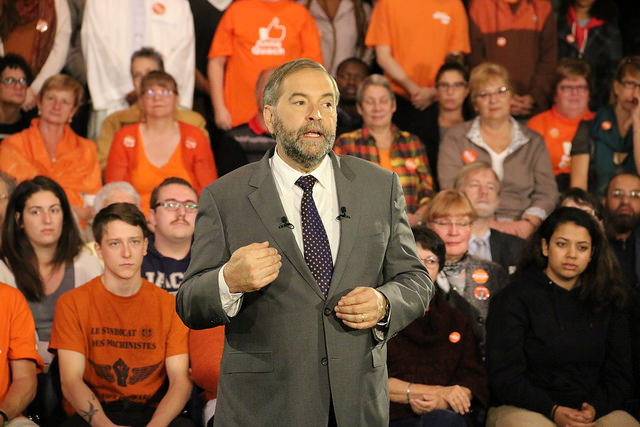Chip in to keep stories like these coming.
For the first time since 1988, the NDP is back to a familiar role in Ottawa: third party in the House of Commons.
Party leader Tom Mulcair has promised a committee will be struck of party stalwarts to assess shortcomings in the 2015 election campaign.
Acceptance is the fifth stage of grief (after denial, anger, bargaining and depression). Many NDP supporters are not there yet.
One way of getting at what went wrong is to identify what needs to be done. After falling from 95 seats to 44 and losing its role as Official Opposition a.k.a. government-in-waiting, the NDP needs a new approach to parliamentary business.
The party needs to set an agenda — for the immediate future and beyond — that draws the attention of Canadians.
Many subjects await the NDP caucus to address in the new Parliament.
The Conservatives introduced major reforms to the way Canadian non-governmental organizations operate, threatening dissolution for those that did not comply. Such bodies are now “corporations” with mandatory structural requirements and reporting deadlines.
Some NGOs were pursued by the Canadian Revenue Agency as perceived enemies of the Conservatives, but all were affected by these changes to the way not-for-profit enterprises operate.
The NDP needs to become the champion of Canadian non-commercial forms of organization. Between the corporate world of profit and the government world of security lies a vast expanse of NGOs, co-operatives and other civil society groups meeting basic human needs.
This third sector provides meaningful work and incomes for many Canadians and has the potential to do much more.
The NDP should work with members of the Voices-Voix coalition that carefully documented the wrong-doings of the Harper government, and lay out some bold ideas for strengthening the NGO sector.
In light of the Paris climate change conference the NDP needs to rethink its environmental policy. While it may have been attractive in the 1990s, cap-and-trade schemes are not a sufficient answer to pressing issues of greenhouse gas emissions.
The NDP must reach out to environmental activists and come up with a new policy direction that puts the party in the line with the best scientific thinking on achieving climate change targets with justice.
The NDP needs to enrich its economic thinking by drawing on its CCF roots as a farmer-labour party, representing the true wealth creators.
By supporting so-called trade deals like the Trans-Pacific Partnership that punish farm families, eliminate jobs and weaken labour incomes, both the Liberals and the Conservatives have abandoned working Canadians.
The NDP needs to speak out about how to strengthen the capacity of farmers, the environmental custodians of vast expanses of Canada; and support wage and salary earners in their struggles to improve the Canadian quality of life in our cities, suburbs and towns.
Drawing up an economic plan for Canada by consulting widely should be a priority for the NDP caucus prior to the Edmonton policy convention next April. A jobs and environmental justice committee made up of NDP MPs should tour Canada in the next months and have a draft report ready for discussion at the riding level.
The inter-generational bargain has broken down. No political party is serious about addressing youth employment or student debt. Figuring out how best to create real jobs for the current generation of overly indebted students should engage every member of the NDP caucus.
At the same time, retirement with dignity is a bad joke for most Canadians. Those who rely mainly on the Canada/Quebec Pension Plan are out of luck.
The NDP needs to put debates over federal transfers and social wages into terms people can understand, and not allow real issues to be buried in phoney debate about the federal budget balance.
Poverty, affordable housing shortages, pollution, poor child care, lack of urban transit, all contribute to general poor health.
A social determinants of health agenda needs to be a priority for domestic policy. Research is well advanced in this area; policy development lags considerably. Federal-provincial policy co-operation and government expenditures can be focused on making Canada a healthy society.
The NDP should put a financial transactions tax on the table. Such a tax exists in the U.K. and 12 other countries, and will come into effect in the EU in 2016. Why should people pay the GST every time they buy so much as a bag of peanuts, but corporations and the wealthy be exempted from tax when they buy and sell stocks and bonds?
By putting together a policy agenda of bold ideas and broad initiatives, the NDP would help Canadians get a measure of the new Liberal government, and give the party a much-needed leadership role in public debate.
Duncan Cameron is the president of rabble.ca and writes a weekly column on politics and current affairs.
Photo: anne campagne/flickr
Chip in to keep stories like these coming.



